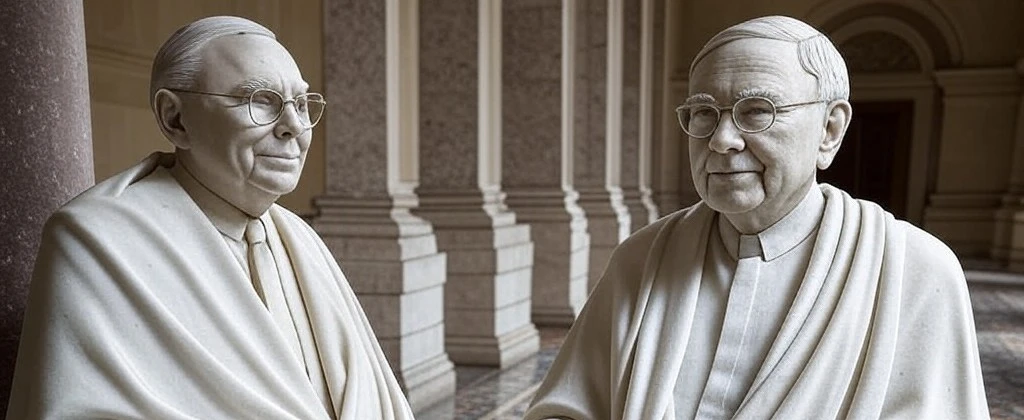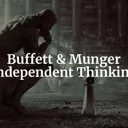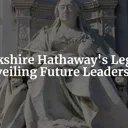Tags: History / Warren Buffett / Charlie Munger
This fanpage is not officially affiliated with Berkshire Hathaway: Disclaimer
In 1975, a looming Securities and Exchange Commission [SEC] investigation threatened the reputations of Warren Buffett and Charlie Munger, but Chuck Rickershauser's legal expertise prevented a potential disaster for the duo and Berkshire Hathaway. Discover how strategic maneuvers, ethical principles, and unwavering integrity not only safeguarded their legacy but also helped Berkshire to thrive in decades to come.

Introduction
In the annals of corporate history, few stories are as gripping as the 1975 saga of how Chuck Rickershauser played a pivotal role in rescuing Warren Buffett, Charlie Munger, and Berkshire Hathaway from a potentially devastating legal crisis. At the heart of this drama was an SEC investigation that threatened to tarnish the impeccable reputations of Buffett and Munger, two of the most respected figures in the investment world 1. This period of heightened regulatory scrutiny came on the heels of the corporate scandals of the previous decade, casting a long shadow over the business landscape 6.
Reputation is a cornerstone in the business world, and for Buffett and Munger, it was everything. Known for their ethical standards and unparalleled investment acumen, any blemish on their record could have had far-reaching consequences 3. This article aims to delve into the intricacies of this legal battle, exploring the strategic maneuvers that helped avert disaster and highlighting the crucial role played by Chuck Rickershauser. With his legal expertise and strategic thinking 7, Rickershauser emerged as a key figure in navigating these treacherous waters.
As we embark on this exploration, we will unravel the events, decisions, and personalities that shaped this high-stakes drama, offering a detailed account of how a potential catastrophe was transformed into a testament to resilience and strategic foresight.
The SEC's Challenge
The origins of the SEC investigation into Buffett and Munger can be traced back to early 1975, when an SEC staff lawyer reached out with what seemed like routine questions. However, the situation escalated when Stanley Sporkin, the formidable head of the SEC’s Enforcement Division, became involved 1. Known for his aggressive approach and high success rate in securing settlements, Sporkin's involvement underscored the seriousness of the situation for Buffett and Munger 6.
The SEC's concerns centered around potential violations of securities laws, particularly regarding the Wesco–Santa Barbara deal and Blue Chip's subsequent purchases. The investigation speculated that Buffett and Munger might have intentionally disrupted the merger by overpaying for Wesco’s stock, which could lead to civil fraud charges against Blue Chip, Buffett, and Munger personally 1.
To understand the gravity of these charges, it is essential to consider the historical context of the SEC's role. Established in the aftermath of the 1929 stock market crash, the SEC was tasked with restoring investor confidence and enforcing securities laws 2. The 1970s, marked by economic uncertainty and increased regulatory oversight, further amplified the stakes for businesses operating in this environment 2.
For Buffett and Munger, the personal stakes were immense. Protecting their reputations and the integrity of their business empire was paramount. The prospect of civil fraud charges loomed large, threatening to undermine everything they had built 1. As the investigation unfolded, it became clear that navigating this challenge would require not only legal acumen but also strategic finesse—a challenge that would ultimately bring Chuck Rickershauser to the forefront of their defense.
In 1975 everything was at stake for Buffett, Munger, and Berkshire Hathaway.

Chuck Rickershauser: The Man Behind the Defense
In the intricate web of legal challenges faced by Warren Buffett and Charlie Munger in 1975, one name stands out as a beacon of defense and strategy: Charles "Chuck" Rickershauser. A distinguished lawyer, Rickershauser was not just a legal advisor; he was a pivotal force in navigating the treacherous waters of the SEC investigation. Born in Los Angeles in 1928, Rickershauser's legal acumen was honed at UCLA Law School, where he graduated first in his class. His early career was marked by a prestigious clerkship with U.S. Supreme Court Justice William O. Douglas, laying the foundation for a career characterized by integrity and commitment 7.
Rickershauser's association with Munger's law firm, where he became a name partner, positioned him as a key player in the legal landscape. His expertise was not just theoretical; it was practical and deeply rooted in his previous work with Buffett and Munger, notably during the See’s transaction ↗. This experience was invaluable as he tackled the SEC's allegations, which threatened to tarnish the reputations of his clients 1.
His strategic approach to the SEC investigation was a masterclass in legal defense. Rickershauser understood that the heart of the matter was not just legal compliance but the preservation of Buffett and Munger's reputations. He engaged with SEC officials, including the formidable Stanley Sporkin, with a blend of persuasion and principle. His interactions were not merely defensive; they were proactive, aiming to prevent civil fraud charges that could cause "terrible, irreversible damage" to his clients' standing 17.
Rickershauser's personal qualities—his unwavering integrity and dedication—made him an invaluable ally. His broader contributions to the legal field, particularly in establishing a powerful corporate practice, underscored his capability and influence. He believed deeply in the importance of reputation, portraying Buffett and Munger as upstanding citizens who had made significant charitable contributions and paid millions in taxes since Buffett's first tax return at age fourteen 17.
The Battle Unfolds
As the SEC investigation gathered momentum, the unfolding battle was nothing short of intense. The issuance of subpoenas marked the beginning of a full-scale investigation into Blue Chip’s purchase of Wesco, with Buffett and Munger at the center of the storm. The SEC's scrutiny was relentless, demanding extensive documentation and subjecting the duo to rigorous questioning. The investigation, titled “In the Matter of Blue Chip Stamps, Berkshire Hathaway Incorporated, Warren Buffet [sic], HO-784,” was a formidable challenge that tested their resolve and strategic acumen 1.
The critical meetings in Washington were pivotal. Here, Buffett and Munger had to defend their actions and clarify Blue Chip's operations under the watchful eyes of the SEC. The pressure was palpable, with key figures like SEC lawyer Larry Seidman probing their business practices. Munger, known for his sharp intellect, emphasized the honesty and integrity that underpinned their decisions. He invoked Benjamin Franklin’s principle, asserting that "the honest policy is the best policy," to justify their actions concerning the Santa Barbara merger 1.
The investigation's impact was not just professional; it was deeply personal. Buffett and Munger felt the weight of persecution, likening the experience to being pursued by a "huge, lumbering giant." The emotional and psychological toll was significant, as they navigated the complexities of the SEC's allegations while maintaining an imperturbable facade to avoid alarming their office staff 1.
Caught in the crossfire was Blue Chip and its management, who faced their own set of challenges. The loyalty program, once a thriving business model, was now under intense scrutiny, adding another layer of complexity to an already fraught situation. The investigation's reach extended beyond financial transactions, probing into the very ethos of Buffett and Munger's business practices and the integrity that defined their careers 4. In the face of such adversity, Rickershauser's defense strategy was crucial. His ability to navigate the legal and reputational challenges, coupled with Buffett and Munger's steadfast commitment to their principles, set the stage for the strategic maneuvers and negotiations that would follow.
The battle was far from over, but the groundwork for a resolution was being meticulously laid.
Strategic Maneuvers and Negotiations
The unfolding drama between Berkshire Hathaway and the SEC in 1975 was marked by strategic maneuvers and deft negotiations, largely orchestrated by Chuck Rickershauser. As the legal counsel for Warren Buffett and Charlie Munger, Rickershauser was instrumental in navigating the complexities of the SEC's investigation into allegations of securities violations. His approach was characterized by a blend of legal acumen and strategic foresight, aiming to protect the reputations of his clients while minimizing potential damages.
One of Rickershauser's key strategies involved proposing a settlement that would consent to an order on minor, technical disclosure violations for Blue Chip Stamps, without implicating Buffett or Munger personally. This maneuver was crucial in steering the investigation away from personal culpability and focusing solely on the corporate entity. Rickershauser understood the importance of maintaining an imperturbable facade, a tactic employed by Buffett to prevent panic among office staff and stakeholders during the tumultuous period 1.
Rickershauser's portrayal of Buffett and Munger as ethical and charitable individuals played a significant role in the negotiations. He emphasized their contributions to society, including their philanthropic efforts and the substantial taxes Buffett had paid since a young age. This narrative was designed to underscore their integrity and commitment to ethical business practices, countering the SEC's allegations of intentional wrongdoing 1.
Throughout the negotiations, Rickershauser made persuasive arguments highlighting the "terrible, irreversible damage" that prosecution would inflict on Buffett and Munger's reputations. He stressed that their reputations were their "most priceless possessions," a sentiment that resonated deeply with the SEC's decision-makers 1. Historical and legal precedents also shaped the negotiations, with Rickershauser drawing on the SEC's history of settlements and enforcement actions to advocate for a resolution that avoided the courtroom 2.
The critical turning points in the negotiations were marked by Rickershauser's ability to leverage these factors effectively, ultimately leading to a resolution that allowed Buffett, Munger, and Blue Chip to move forward without admitting guilt. This outcome not only safeguarded their reputations but also set a precedent for how strategic thinking and negotiation can triumph in the face of regulatory challenges.
The Resolution
The resolution of the SEC investigation was a testament to the effectiveness of Rickershauser's strategic maneuvers. The settlement was encapsulated in a consent decree that named no individuals, ensuring that the reputations of Buffett and Munger remained untarnished. The minimal publicity surrounding the event meant that the potential for reputational damage was significantly mitigated, allowing them to continue their business endeavors without the shadow of scandal 1.
For Buffett, Munger, and Blue Chip, the resolution was significant. It allowed them to move forward without admitting guilt, preserving their standing in the business community and maintaining the trust of their shareholders. The broader impact on Berkshire Hathaway was profound, as the company avoided potential financial and reputational damage that could have arisen from a protracted legal battle 5.
The investigation and its resolution offered several lessons, particularly the importance of transparency and ethical business practices. The ordeal underscored the need for clear communication and adherence to regulatory standards, principles that Buffett and Munger would continue to champion in their business dealings 3. The subsequent appointment of Buffett to a blue-ribbon panel to study corporate disclosure signaled a fresh start and a renewed focus on transparency, reinforcing the themes of forgiveness and fresh starts that emerged from the resolution 1.
The resolution of the SEC investigation was a triumph of strategic thinking and negotiation. It highlighted the critical role that legal expertise and ethical conduct play in navigating regulatory challenges, setting a precedent for how businesses can successfully manage crises while upholding their reputations.
The Legacy of the Crisis
The 1975 SEC investigation into Warren Buffett and Charlie Munger was a defining moment for Berkshire Hathaway and its leadership, leaving an indelible mark on their approach to business and investment. The crisis highlighted the importance of reputation management and ethical business practices, which became cornerstones of Buffett and Munger's investment philosophy. This period of intense scrutiny reinforced their belief that maintaining a good reputation was not only a moral imperative but also a strategic advantage in the business world 1.
In the aftermath of the investigation, Buffett and Munger's focus on ethical conduct and integrity became even more pronounced. They learned valuable lessons about the complexities of regulatory compliance and the potential pitfalls of aggressive business maneuvers. This experience influenced their subsequent business decisions, particularly in the realm of mergers and acquisitions. They adopted a more cautious and transparent approach, ensuring that all transactions were above board and aligned with their ethical standards 5.
The crisis also had a broader impact on the investment community, serving as a wake-up call about the importance of regulatory compliance and the potential consequences of neglecting it. Investors and companies alike became more aware of the need for transparency and accountability in their dealings, leading to a heightened focus on corporate governance and ethical leadership 2.
Public perception of Buffett and Munger as ethical and principled leaders was solidified through their handling of the crisis. Despite the challenges, they emerged with their reputations intact, largely due to their unwavering commitment to honesty and fairness. This reinforced their image as trustworthy stewards of investor capital and set a high standard for ethical conduct in the business world 3.
Chuck Rickershauser played a pivotal role in the successful resolution of the crisis, earning a legacy as a trusted advisor who skillfully navigated the legal complexities of the situation. His contributions were instrumental in protecting the reputations of Buffett and Munger, and his counsel was invaluable in steering them through the turbulent waters of the investigation 7.
Ultimately, the enduring value of integrity and ethical conduct in business was underscored by the way Buffett and Munger handled the crisis. Their commitment to these principles not only safeguarded their reputations but also laid the foundation for the continued success and growth of Berkshire Hathaway 3.
Historical and Economic Context
To fully appreciate the significance of the 1975 SEC investigation, it's essential to understand the historical and economic context of the era. The 1970s were marked by significant economic challenges, including inflation, recession, and increased regulatory scrutiny. These conditions created a volatile environment for businesses and investors, necessitating a careful and strategic approach to navigating the market 2.
The Securities and Exchange Commission, established in the wake of the 1929 stock market crash, played a crucial role in enforcing securities laws and protecting investors. Its evolution from a passive entity to an aggressive enforcement body was driven by the need to restore investor confidence and prevent corporate malfeasance. The SEC's mandate was shaped by landmark legislation, including the Securities Act of 1933 and the Securities Exchange Act of 1934, which aimed to create a robust regulatory framework for the securities industry 2.
The economic conditions of the 1970s were further complicated by broader political and social changes, such as the rise of consumer protection and corporate accountability movements. These shifts reflected a growing demand for transparency and ethical conduct in business, aligning with the SEC's efforts to hold companies accountable for their actions 6.
Understanding these historical and economic factors is crucial to comprehending the challenges faced by Buffett, Munger, and Berkshire Hathaway during the crisis. The regulatory environment of the 1970s required companies to be vigilant and proactive in their compliance efforts, and the SEC's investigation served as a stark reminder of the potential consequences of falling short 2.
Thus, the historical and economic context of the 1970s played a significant role in shaping the events and outcomes of the 1975 SEC investigation. The lessons learned during this period continue to resonate today, underscoring the importance of ethical leadership and regulatory compliance in the ever-evolving landscape of business and investment 2.

Conclusion
The saga of the 1975 SEC investigation serves as a pivotal chapter in the history of Berkshire Hathaway, illustrating the profound impact of Chuck Rickershauser in safeguarding the reputations of Warren Buffett and Charlie Munger. His legal expertise and strategic foresight were instrumental in navigating the complexities of the SEC's scrutiny, ultimately averting a potential disaster that could have tarnished the esteemed reputations of two of the most respected figures in the investment world 1.
This episode underscores the vital lessons learned about the importance of integrity, transparency, and strategic thinking in business. The resilience demonstrated by Buffett and Munger, coupled with Rickershauser's adept negotiation skills, highlighted how ethical conduct can triumph over adversity. Their commitment to maintaining a good reputation not only preserved their standing in the business community but also reinforced their belief that ethical practices are essential to long-term success 3.
The legacy of Buffett and Munger as ethical and principled leaders has only been solidified through their handling of this crisis. Their ability to emerge with their reputations intact, despite the intense scrutiny, has established them as paragons of integrity in an industry often marred by questionable practices. This incident served as a reminder that a business's most valuable asset is its reputation, a sentiment echoed by Rickershauser when he emphasized that their reputations were their "most priceless possessions" 13.
Moreover, the broader impact of the crisis on the investment community cannot be overstated. It highlighted the necessity for regulatory compliance and ethical conduct, prompting a shift in how investors and companies approach transparency and accountability. The lessons from this investigation continue to resonate today, reinforcing the need for vigilance in adhering to regulatory standards 2.
Looking ahead, Berkshire Hathaway's continued success is deeply rooted in the principles and philosophies established by Buffett and Munger. Their unwavering commitment to ethical conduct, combined with strategic decision-making, positions the company favorably in an ever-evolving market landscape 5.
In reflecting on the historical and economic context of the 1970s, we gain a richer understanding of the challenges faced during this period. The regulatory environment of the time demanded not only compliance but also a proactive approach to reputation management, a lesson that remains relevant in today's business world 2.
Ultimately, the resolution of the 1975 SEC investigation serves as a timeless reminder of the enduring value of integrity and ethical conduct in business. The careful negotiation and strategic maneuvers employed by Rickershauser, Buffett, and Munger exemplify how these principles can guide leaders through even the most challenging circumstances, ensuring that their legacies are not only preserved but also celebrated for generations to come 3.
References
-
Alice Schroeder, "The Snowball", Chapter 39: The Giant; Bloomsbury Publishing, 2009 ↩↩↩↩↩↩↩↩↩↩↩↩↩↩↩↩↩↩
-
The SEC: A Brief History of Regulation - www.investopedia.com ↩↩↩↩↩↩↩↩↩↩
-
Charlie Munger: Life, Berkshire Hathaway, Investments - www.investopedia.com ↩↩↩↩↩↩↩
-
Blue Chip Stamps - Wikipedia - en.wikipedia.org ↩
-
Berkshire and Blue Chip Stamps - www.gurufocus.com ↩↩↩
-
Stanley Sporkin, Bane of Corporate Corruption, Dies at 88 (Published 2020) - www.nytimes.com ↩↩↩
-
Charles Rickershauser Jr. dies at 86; lawyer led Pacific Stock Exchange - www.latimes.com ↩↩↩↩↩
-
Charles Rickershauser Obituary - www.legacy.com ↩












